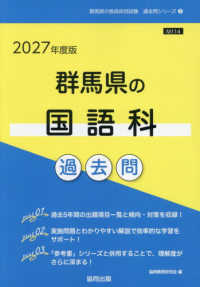Full Description
Colonising and Decolonising argues for a decolonised and ethicised curriculum. Grounded in an interdisciplinary approach, it draws upon the fields of history, sociology, education, anthropology, philosophy, indigenous studies, and more, to allow a nuanced and multifaceted exploration of the subject matter.
Focusing on the concepts and practices of coloniality and decoloniality, it uses this focus as a framework for positioning concepts as acquired dispositions in the way we live. Philosophical topics addressed include: concepts and descriptors, knowledge, facts and values, free will and volition, coloniality, decoloniality, curriculum, sapience, strong normative evaluations, pedagogy, rationality, freedom, ethics, learning practices, thinking, ecology, imaginative possibility, and inclusion.
A robust and erudite exploration of the imperative of decolonisation, this volume will appeal to scholars and researchers across a broad range of disciplines including specialist fields of education research, decolonial theory, sociology, epistemology, and philosophy of education.
The Open Access version of this book, available at http://www.taylorfrancis.com, has been made available under a Creative Commons [Attribution-Non Commercial-No Derivatives (CC BY-NC-ND)] 4.0 license.
Contents
1. Introduction Part I: Colonisations 2. Epistemic Colonisation: Indigenous Peoples 3. Cultural Colonisation: The Indian Diaspora 4. Colonial Identities: Arab-Israeli Conflicts 5. Political and Economic Colonisation: Empire and Commerce 6. Taxonomic Colonisation: Rethinking Racism and Notions of Race in Global Educational Contexts 7. Colonial Institutions: Curricula, Pedagogies and Learnings Part II: Decolonisations 8. Epistemic Decolonisation: Truth, Justification and Ethics 9. Feminist Decolonisations: The Women's Rights Movement 10. The Gay Rights Movement: Decoloniality and Universality 11. Anti-Racist Strategies and Pedagogies: Taxonomic Decolonisation 12. Indigenous and Colonial Knowledge 13. Coloniality/Decoloniality








